We Are in Serious Trouble on Donations
A very serious problem is evolving due entirely to a blind eye to funding. We can’t do this. Wish we could but we can’t. As long as most of you ignore the fundraising. The problem will mount.
The situation is quite serious now.
Marc Ash
Founder, Reader Supported News
If you would prefer to send a check:
Reader Supported News
PO Box 2043 / Citrus Heights, CA 95611
Follow us on facebook and twitter!
Live on the homepage now!
Reader Supported News
In advance of the hearings, my colleague Amelia Thomson-DeVeaux wrote that Jackson’s identity as a Black woman as well as her professional background as a former public defender meant that it was likely she’d be subjected to more questions regarding her qualifications than another nominee would be. And sure enough, Republicans on the Senate Judiciary Committee wasted little time grilling Jackson — often in ways that suggested women and people of color are less qualified than their white counterparts, or that their race makes them inherently biased against white people.
There were attacks both inside — and outside — of the hearings that tried to paint Jackson as a supporter of critical race theory, a legal framework for understanding systemic racism that the GOP has co-opted as a catch-all term for anything related to race. Her judicial record in cases involving child pornography was also heavily scrutinized, even though there is no evidence that she was uncommonly soft in her sentences.
We don’t know yet whether the hearings will dramatically alter Americans’ support of Jackson, but at this point, many Americans support her confirmation. Per a March 1-18 poll from Gallup, 58 percent of Americans said the Senate should vote to confirm Jackson, versus 30 percent who thought she should not be confirmed and 12 percent who had no opinion. Notably, that’s the second-highest level of support that Gallup has recorded for a Supreme Court nominee dating back to Robert Bork’s nomination in 1987.1 Only Chief Justice John Roberts scored higher than Jackson, and only slightly higher — 59 percent of Americans said they supported his nomination in 2005.
For weeks now, anywhere from a plurality to a majority of Americans have said that they support confirming Jackson. No polls have been conducted entirely after the start of the confirmation hearings — but nine different polls have found plurality support for Jackson’s confirmation since Jackson was announced as the nominee2 and five more have found majority support for it.3
Many Americans support Ketanji Brown Jackson’s confirmation
Share of Americans or registered voters who say they support, oppose or have no opinion on the confirmation of Ketanji Brown Jackson to the Supreme Court
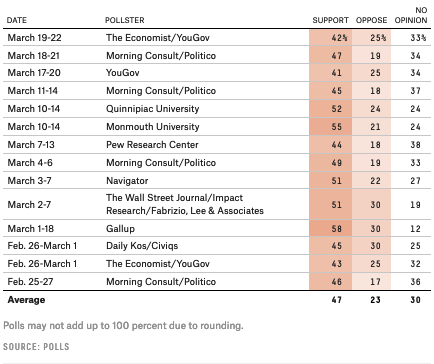
But while Jackson has enjoyed majority support in many polls, there’s likely a ceiling to her approval since political polarization has made the process of selecting Supreme Court justices more contentious.
Support for Jackson’s nomination among Democrats has been particularly high, sometimes clocking upward 70 percent in the polls we looked at, but Republicans’ views have been much more divided. For instance, Morning Consult/Politico found in late February that 25 percent of Republicans thought that the Senate should confirm Jackson, while 30 percent opposed her nomination. But across three subsequent polls in March, support was lower among Republicans and opposition was higher, hovering in the mid-to-high 30s. Polls from The Economist/YouGov, dating from Feb. 26-March 1 and March 19-22, found a similar trend — but with greater levels of opposition among Republicans. In the earlier poll, 45 percent opposed confirming Jackson, but this figure grew to 52 percent in the later poll.
Recent Supreme Court nominees haven’t received the same level of support they once did from Congress, either. Of the seven justices confirmed since Stephen Breyer, only Roberts has received more than 69 percent of the Senate voting in favor of confirmation. He is also the only justice among those seven to have earned the backing of a majority of the other party’s senators.
Filling Supreme Court seats has become more contentious
Share of yes votes for Supreme Court nominees, since 1789
Three Republican senators backed Jackson’s nomination to the U.S. Court of Appeals for the D.C. Circuit last year, but as evidenced by the tenor of this week’s hearings, there’s little chance Jackson garners more — or even the same level of — Republican support this time around.
If confirmed, Jackson would be the first Black female Supreme Court justice, and as such, many Americans think her nomination is historic. A March 7-13 poll from the Pew Research Center found that 66 percent of Americans thought Jackson’s nomination was at least somewhat important. And a March 10-14 poll from Monmouth University found that 53 percent of Americans approved of Biden prioritizing the nomination of a Black woman. But one Associated Press/NORC Center for Public Affairs Research poll from Feb. 18-21, which predates Biden’s nomination of Jackson, found lower levels of support for his promise to appoint a Black woman. Fifty-two percent of Americans said it was at least somewhat important to them that a Black woman become a Supreme Court justice, while 48 percent said it was not very or not at all important to them.
For Black Americans, Jackson’s nomination has been especially important. For instance, that Pew survey found that 90 percent of Black adults said having a Black woman on the Supreme Court would be at least somewhat important to them, compared with 66 percent of adults overall. And even though the AP/NORC poll found that a smaller share of Americans thought it was important a Black woman be nominated to the court, 85 percent of Black Americans said in that poll that it was at least somewhat important to them. But as my colleague Alex Samuels wrote earlier this week, this is likely not enough to substantially improve Black voter turnout or Democrats’ prospects in the upcoming midterm elections.
With the hearings now over, we now wait for Jackson’s confirmation vote. Given that the Senate almost surely won’t vote within the next week, there’s still plenty of time for public opinion to change around Jackson, especially as clips from the hearings make the rounds on social media and television. At this point, though, Jackson still benefits from having the support of many Americans, and opposition to her nomination doesn’t seem to exceed typical partisan divides. With a Democratic-controlled Senate, that might be all that’s needed for her ascension to the nation’s highest court.
Other polling bites
- Generation Z is the least religious generation yet, according to recently published data from the December 2021 American National Family Life Survey from the American Enterprise Institute’s Survey Center on American Life. Thirty-four percent of Generation Z (those between the ages of 18 and 24) reported being religiously unaffiliated, compared with just 9 percent of those in the Silent Generation (those between the ages of 76 and 93). The survey’s authors attribute Gen Z’s lack of religious affiliation to less religious participation during their formative years, finding that compared with older generations, Gen Z was less likely to have attended religious services or educational programs, or to have prayed with their family or read religious texts while growing up. A greater share of Gen-Z Americans also said they were never religious (15 percent, compared with 10 percent of 25- to 40-year-olds, 6 percent of 41- to 56-year-olds, 3 percent of 57- to 75-year-olds, and zero percent of 76- to 93-year-olds).
- Americans largely plan to tune out the 94th Academy Awards, according to a March 4-7 poll from YouGov. Forty-nine percent said they were not interested at all in watching the Oscars, while just 9 percent said they were very interested. That’s in line with a March 15-18 poll from Morning Consult/Politico, where 67 percent of Americans said they were probably or definitely not going to watch. Of the best-picture nominees, YouGov found that “Dune” had the highest share of Americans who said they’d watched it — 26 percent — followed by “West Side Story” (25 percent) and “Don’t Look Up” (24 percent). And Morning Consult/Politico found that 22 percent had watched some or all of “Don’t Look Up,” versus 20 percent for “Dune” and 16 percent for “West Side Story.” (For more on what Americans think about the movies, you can check out our latest “The United Stats of America” episode here.)
- What schools teach is a hot-button issue in the U.S., and although 71 percent of Americans said in a March 15-20 poll from Grinnell College/Selzer & Company that they trusted schools in their district to ensure library books are appropriate, only 49 percent said they trusted their local district when it came to teaching about racism. (Forty-three percent said they didn’t trust their district on teaching racism, compared with the 22 percent who said the same of their district and its library books.) Furthermore, when asked about what children were being taught in public schools, 64 percent said that schools were on the wrong track, while just 24 percent said schools were heading in the right direction.
- In the wake of high gas prices brought on by inflation and sanctions on Russia, a majority of likely voters think the U.S. should now increase domestic production of oil and gas. According to a March 18-21 poll from Echelon Insights, a Republican firm, 69 percent said that the U.S. should increase domestic production in response to banning imports of Russian oil, and 62 percent said that increasing production domestically was the best way to deal with rising gas prices. When asked about specific policies, 42 percent supported approving the Keystone XL pipeline and 41 percent supported expanding oil drilling on federal lands.
- A majority of American men have invested at least something in cryptocurrencies, according to a March 14-20 poll from The Harris Poll. To be sure, 49 percent of men surveyed said they’d invested nothing at all in cryptocurrencies, versus 51 percent who’d invested at least some, but that stands in stark contrast with American women. Nearly three-quarters of women (72 percent) have zero crypto investments, while 28 percent have invested at least some.
Biden approval
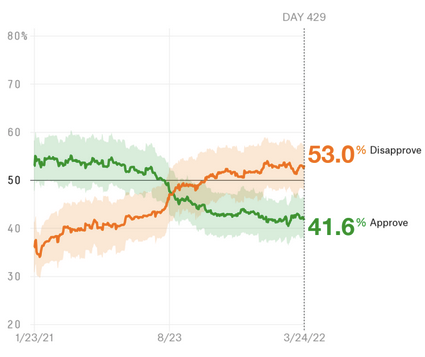
According to FiveThirtyEight’s presidential approval tracker,4 41.6 percent of Americans approve of the job Biden is doing as president, while 53.0 percent disapprove (a net approval rating of -11.4 points). At this time last week, 42.2 percent approved and 52.9 percent disapproved (a net approval rating of -10.7 points). One month ago, Biden had an approval rating of 42.1 percent and a disapproval rating of 52.7 percent, for a net approval rating of -10.6 points.
Generic ballot
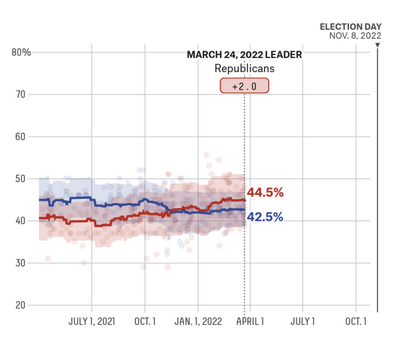
In our average of polls of the generic congressional ballot,5 Republicans currently lead by 2.0 percentage points (44.5 percent to 42.5 percent). A week ago, Republicans led Democrats by 2.2 points (44.8 percent to 42.7 percent). At this time last month, voters preferred Republicans by 2.5 points (45.0 percent to 42.5 percent).
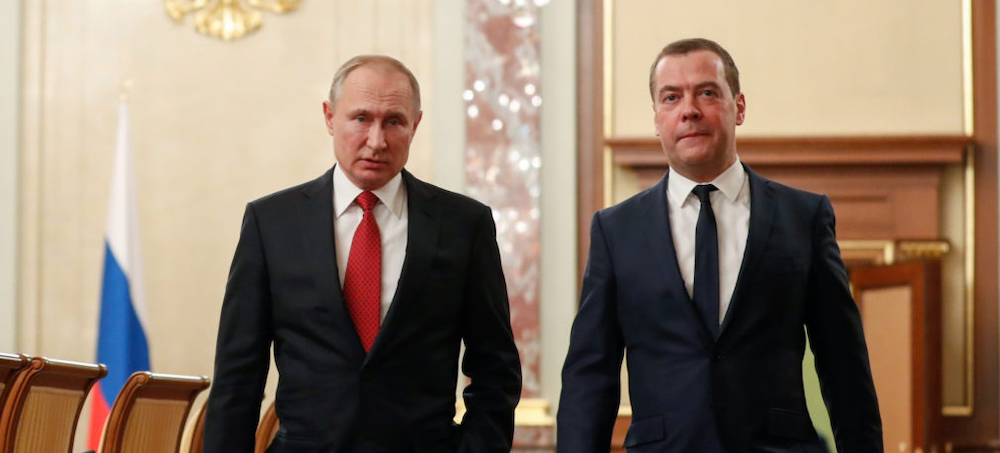 Russian president Vladimir Putin and Dmitry Medvedev. Medvedev said Moscow could strike against an enemy that only used conventional weapons. (photo: Dmitry Astakhov/Reuters)
Russian president Vladimir Putin and Dmitry Medvedev. Medvedev said Moscow could strike against an enemy that only used conventional weapons. (photo: Dmitry Astakhov/Reuters)
Senior politician Dmitry Medvedev says Moscow’s nuclear doctrine does not require enemy state to use such weapons first
Dmitry Medvedev, a former Russian president who is deputy chairman of the country’s security council, said Moscow could strike against an enemy that only used conventional weapons while Vladimir Putin’s defence minister claimed nuclear “readiness” was a priority.
The comments on Saturday prompted Ukraine’s president, Volodymyr Zelenskiy, in an appearance by video link at Qatar’s Doha Forum to warn that Moscow was a direct threat to the world.
“Russia is deliberating bragging they can destroy with nuclear weapons, not only a certain country but the entire planet,” Zelenskiy said.
Putin established the nuclear threat at the start of the war, warning that western intervention would reap “consequences you have never seen”.
Western officials have said the threats may be simply an attempt to divert attention from the failure of Putin’s forces to secure a swift occupation of the Ukrainian capital, Kyiv, and to make advances in other key areas of the country.
An adviser to Ukraine’s defence ministry, Markian Lubkivskyi, claimed on Saturday that Russia would soon lose control of the southern city of Kherson, the first major centre to fall to the Kremlin since the war began on 24 February.
He said: “I believe that today the city will be fully under the control of Ukrainian armed forces. We have finished in the last two days the operation in the Kyiv region so other armed forces are now focused on the southern part trying to get free Kherson and some other Ukrainian cities.”
Russia has approximately 6,000 nuclear warheads – the largest stockpile of nuclear weapons in the world. In an interview on Saturday, Medvedev said Russia’s nuclear doctrine did not require an enemy state to use such weapons first.
He said: “We have a special document on nuclear deterrence. This document clearly indicates the grounds on which the Russian Federation is entitled to use nuclear weapons. There are a few of them, let me remind them to you: number one is the situation, when Russia is struck by a nuclear missile. The second case is any use of other nuclear weapons against Russia or its allies.
“The third is an attack on a critical infrastructure that will have paralysed our nuclear deterrent forces. And the fourth case is when an act of aggression is committed against Russia and its allies, which jeopardised the existence of the country itself, even without the use of nuclear weapons, that is, with the use of conventional weapons.”
Medvedev added that there was a “determination to defend the independence, sovereignty of our country, not to give anyone a reason to doubt even the slightest that we are ready to give a worthy response to any infringement on our country, on its independence”.
Russia’s defence minister, Sergei Shoigu, who had not been seen for 12 days before a brief appearance on Friday and an address to his generals on Saturday, also spoke about the nuclear threat contained within Russia’s arsenal.
In a video, uploaded on social media by the Russian defence ministry, Shoigu said he had discussed issues related to the military budget and defence orders with the finance ministry.
He said: “We continue ahead-of-schedule delivery of weaponry and equipment by means of credits. The priorities are long-range, high-precision weapons, aircraft equipment and maintenance of engagement readiness of strategic nuclear forces.”
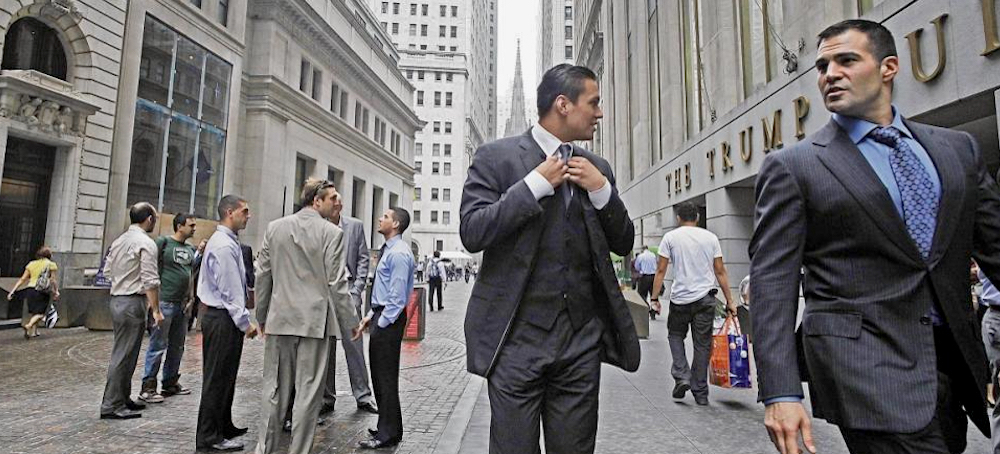 People walk along Wall Street. (photo: AP)
People walk along Wall Street. (photo: AP)
As workers struggled throughout the pandemic, Wall Street bonuses hit a nearly 15-year high.
According to findings from the Economic Policy Institute, the growth in worker productivity over the past seventy years hasn’t been mirrored by anything like a commensurate increase in wages. In recent decades, however, compensation for those now at the commanding heights of financial activity has ballooned — average Wall Street bonuses growing by an astonishing 1,743 percent since 1985 when adjusted for inflation (had the minimum wage grown at the same rate, it would currently be $61.75 rather than a meager $7.25).
The breathtaking extent of this growth is dramatically illustrated in a new report from the Institute for Policy Studies’ Sarah Anderson, which finds that the average Wall Street bonus in 2021 was $257,500, up 20 percent from 2020 and significantly higher than in any year since the 2008 financial crash.
The jump is particularly notable in light of ongoing debates concerning inflation and the cost of living. As Anderson observes, the rise in Wall Street bonuses considerably outstripped the annual inflation rate of 7 percent — a rate that itself outpaced the comparatively small 2 percent increase in average weekly earnings among private sector workers. And that’s to say nothing of base salaries on Wall Street, which themselves averaged over a quarter of a million dollars last year.
All in all, finds Anderson, the bonus pool alone for Wall Street’s privileged workforce of 180,000 was $45 billion — enough to sustain a million jobs paying $15 an hour for an entire year.
Nearly fifteen years on from the 2008 meltdown and in the wake of the significant economic downturn wrought by the coronavirus pandemic, the continued explosion of Wall Street bonuses is yet a further reminder of the American economy’s fundamental inefficiency. While workers becoming vastly more productive yields limited gains for the broad majority, even a massive financial implosion like 2008 has done nothing to arrest the runaway greed of the country’s economic elite.
As Anderson points out, even the relatively modest provision in 2010’s Dodd-Frank legislation designed to curb out of control Wall Street pay has yet to be implemented — thanks in large part to the industry’s successful capture of Congress and its efforts at lobbying. At the same time, Democrats last year failed to pass a promised increase in the minimum wage, which hasn’t been raised even once since July 2009.
Following Reaganism’s successful conquest of American politics in the 1980s and the corresponding financialization of the economy, it’s been an axiom in both major parties that reigning in the market inevitably does more harm than good — even for those at the bottom of the economic pyramid. Particularly in the wake of 2008 and since essential workers bore the brunt of the pandemic, this already untenable premise has been impossible to sustain.
Simply letting the markets rip has yielded regular instability. More to the point, it’s allowed gains to accrue to an increasingly narrow class at the top whose rewards often bear no relation to productivity or actual value created. Regulating and reigning in America’s hyper-financialized economy is therefore urgent, overdue, and the absolute minimum required to create an economic settlement in which the workers who perform the essential labor that sustains daily life collect the share of wealth they actually deserve.
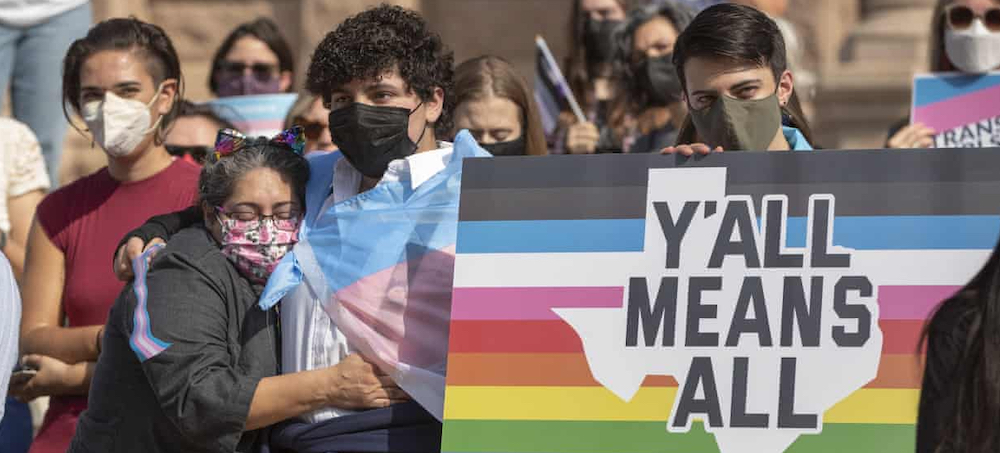 A rally for transgender rights in Texas. (photo: Jay Janner/AP)
A rally for transgender rights in Texas. (photo: Jay Janner/AP)
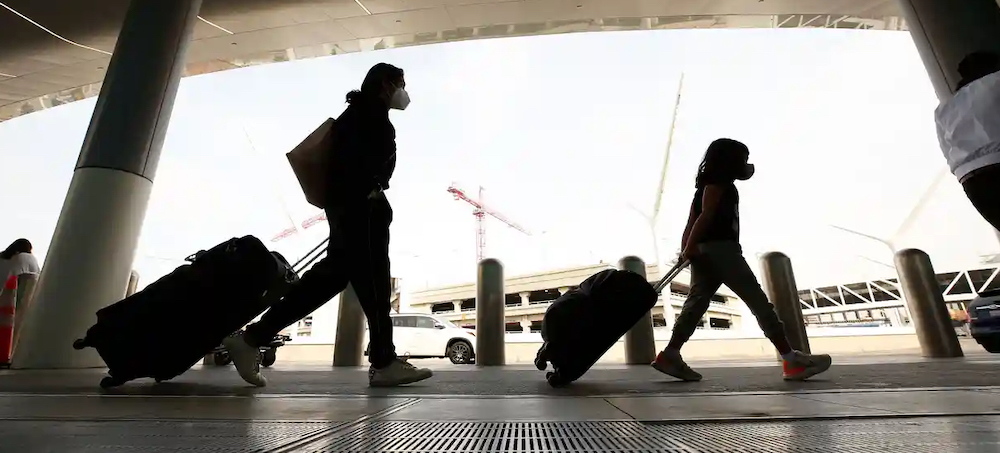 The lawsuit was filed in California because some of the questioning allegedly occurred at Los Angeles international airport. (photo: Al Seib/Rex/Shutterstock)
The lawsuit was filed in California because some of the questioning allegedly occurred at Los Angeles international airport. (photo: Al Seib/Rex/Shutterstock)
Trio file lawsuit against homeland security department, alleging questions about faith were in violation of constitutional rights
The men involved in the lawsuit claim that US border officers at land crossings and international airports peppered them with questions about whether they were Muslim and attended a mosque and how often they prayed.
Abdirahman Aden Kariye, a Minnesota imam and plaintiff in the suit, said he has been questioned about his faith at least five different times when he was returning to the country between 2017 and 2022.
The repeated questioning caused Kariye stress and led him to stop wearing a Muslim cap known as a kufi, and to stop carrying religious texts when he travels internationally to avoid additional scrutiny, the lawsuit said.
“I am proud to be a Muslim,” said Kariye. “But now whenever I travel back home to the United States, I’m anxious. I’m constantly worried about how I will be perceived, so much so that I try to avoid calling any attention to my faith.”
The three men from Minnesota, Texas and Arizona sued Department of Homeland Security officials in a federal court in Los Angeles. The lawsuit was filed in California because some of the questioning allegedly occurred at Los Angeles airport.
The American Civil Liberties Union, which is representing the men, said the questioning violated the men’s constitutional rights to freedom of religion and protection against unequal treatment.
“Just as border officers may not single out Christian Americans to ask what denomination they are, which church they attend, and how regularly they pray, singling out Muslim Americans for similar questions is unconstitutional,” said the lawsuit.
It added: “By targeting plaintiffs for religious questioning merely because they are Muslim, defendants’ border officers stigmatize them for adhering to a particular faith and condemn their religion as subject to suspicion and distrust.”
It asks a judge to declare the religious questioning was unconstitutional and to order US government agencies to expunge records containing information that was obtained through the questioning of the men.
The Department of Homeland Security did not immediately return a Guardian request for comment about the lawsuit.
Another plaintiff, Hameem Shah, a resident of Plano, Texas who works in financial services, said he was returning in 2019 from a vacation to Serbia and Bosnia when he was pulled aside at the Los Angeles airport for additional screening.
Officers separated him from other travelers and started reading his personal journal, despite his opposition, and asked him whether he had traveled in the Middle East, saying they wanted to make sure he was a “safe person”, the lawsuit said.
They also asked him about his religious beliefs and practices, and searched his phone and released him two hours later, the lawsuit said.
“I thought that being an American meant that I and others are free to practice any religion that we choose,” Shah said in a statement, adding that the airport experience he had still haunts him.
“Religious questioning by border officers is unconstitutional, and it’s past time for the government to be held to account,” said Ashley Gorski, senior staff attorney with the ACLU’s National Security Project.
“This invasive questioning serves no legitimate law enforcement purpose, and conveys the harmful and stigmatizing message that the US government views Muslims as inherently suspicious,” she added.
American border security have historically targeted and profiled Muslims for religious questioning in airports. In 2010, ACLU, along with other organizations, filed complaints to DHS regarding border questioning of Muslims about their religious beliefs and practices.
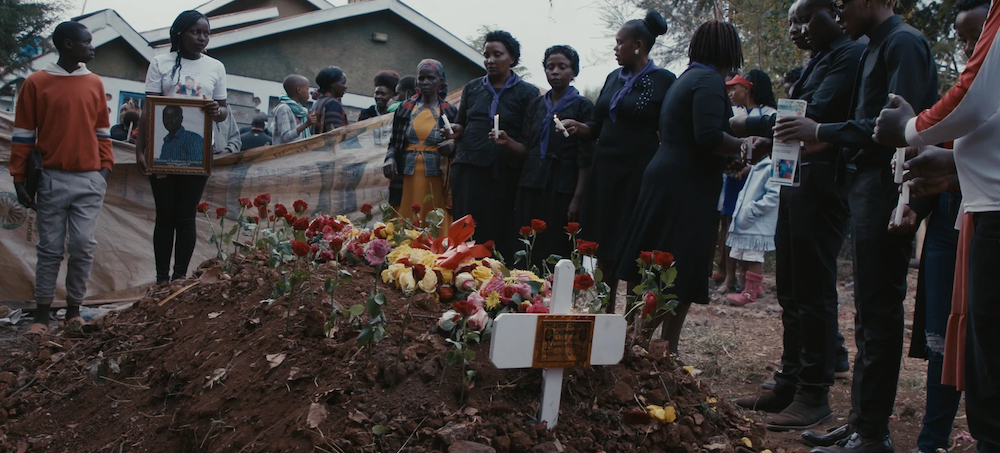 Relatives at Philomen Chepkowny's grave. (photo: VICE)
Relatives at Philomen Chepkowny's grave. (photo: VICE)
A new film by VICE World News investigates accusations of systemic abuses – including the summary execution of suspects – committed by police in Kenya.
“One was a woman dressed in niqab…carrying an AK47 in her right hand,” he told VICE World News. The male was on the left. He came directly towards me with a pistol in his hand and pointed, [before saying] ‘Abdi”, let's have a walk.’”
He would later learn that his arrest followed a robbery in his neighbourhood in which the suspects made off on a motorbike. Police accused him of helping the culprits escape and wanted him to identify the suspects.
“I was crying, explaining to them that I did not help anyone to escape,” he added.
Abdi, whose name has been changed to protect his identity, says that no evidence against him was ever presented and he was never taken to a police station. During his detention, he was interrogated, beaten and denied food.
Roughly 48 hours into his disappearance, he recalls being given a drink and immediately losing consciousness after swallowing it. He was found by a stranger, dumped on the side of the road, bleeding from a gash to his head, 100 miles outside of the city.
Abdi is still jumpy and worries about moving around the city.
“We have seen more people disappear,” Abdi said. “It has brought me shock again. So I cannot move freely. I feel like I’m the next victim. And this time around, maybe if I go again, I’m not coming back home alive.”
Abdi’s trauma and his experience are commonplace in Kenya, where disappearances, torture, and extrajudicial executions are routine tactics for solving crimes ranging from petty robberies to terrorist rings. Two-thirds of victims of police disappearances in Kenya are never seen again.
Sixty percent of police disappearances and murders target men, many from Muslim neighbourhoods like Abdi’s. “It’s a systematic culture of death permeating our societies,” Peter Kiama, Executive Director of the Independent Medico-Legal Unit (IMLU), a human rights organisation that has been documenting incidences of police torture and killings, told VICE World News. “We have seen a clear pattern where torture, killings and forced disappearance are part of the policing system since 2013 and that is why many officers involved get away with it.”
Police brutality has only gotten worse in recent years, with a police force emboldened by efforts to tackle the country’s terrorist threat. For over a decade, Kenya has grappled with radicalisation and successive deadly terrorist attacks by the Somalia-based Al-Qaeda affiliate Al Shabaab.
In the early 2010s, the government established a multi-agency security operation, which granted the police sweeping powers to profile and arbitrarily detain. The 2012 Prevention of Terrorism Act vaguely defined terrorism and allowed the state to profile terror suspects without due process. This broad mandate soon extended far beyond pursuing suspected terrorists. These tactics are meted out in largely Muslim areas of Kenya’s capital, Nairobi, and in coastal towns. Increasingly, they are also used to silence government critics.
While many in Kenya have become desensitised to reports of police killings, in January 2022, the bodies of dozens of men floated to the shores of a river in Western Kenya, shocking people across the country into speaking out about a suspected spate of police killings.
“In all the cases I've dealt with – and I have been to a lot of post-mortems – I have never seen something like this…seeing 25 bodies. It’s just a lot in one place”, Boniface Ogutu, a human rights defender in western Kenya, told VICE World News.
“We had bodies that had their hands tied together with a rope, some were put inside polythene bags… A lot of them just sort of looked like they were being tortured before being tossed into the water.”
Local rights groups led the search for bodies in January. But when the news gained national attention and police took over the search operation, Ogutu says his colleagues and a local diver retrieving the bodies were forced to stand down from their search.
“We were relying on a diver called Okero… he got threatened and had to go to a safer place,” Ogutu said of the recovery effort. “He was summoned by the police…when he reached the police station, his phone was confiscated. Then, he was detained incommunicado for the rest of the day… he was paraded in front of some senior government officials and was also threatened directly because he was told that he's very easy to deal with.”
Ogutu’s suspicions hit at another key driver of police misconduct across Kenya: a weak judiciary fed by corruption and insufficient evidence collection.
“Plenty of time, the evidence collected by security agencies does not rise to the threshold for the judiciary to prosecute,” Abdullahi Boru Halakhe, a regional peace and security expert, said.
This pervasive lack of faith in the judiciary leaves Kenyans seeking justice for disappeared loved ones with nowhere to turn.
Philomen Chepkwony’s family is among those seeking answers over the death of their 37-year-old brother. Chepkwony was reported missing in December after he disappeared while driving from his home in Nairobi to the city of Nakuru along with two other men. Chepkwony and his friend Peter Mutuku’s remains were retrieved from the same section of Yala River. The discovery of their rental car – abandoned more than 250km away from where their bodies were found along with criminal charges against both men – raised questions about how they got there and why they were killed.
Chepkwony was wanted for car theft and was out on bail awaiting trial when he disappeared.
“It was very devastating. I cried like a baby,” Naomi Cheptoo, the deceased’s sister told VICE World News. “I couldn't imagine that my brother was dead…he was tortured and murdered and thrown in a river.”
For Cheptoo, her brother’s suspected crimes are irrelevant. “There's a court of law. It's not alright for people to just go killing people because they believe they're criminals. I mean, everybody's innocent until proven guilty, right?”
She has little faith that the family will get justice for her brother’s death, a notion shared by many families of those found in Yala River as police investigations and post-mortems barely progress. Despite the national attention paid to the Yala River bodies, police have not issued an update on the findings of the overall investigation; only 11 out of 26 bodies have been identified.
“Many people have gotten away with… bad things in Kenya,” Cheptoo said. “And if the investigation was really thorough, we would have some little information about my brother's death. But now, we don't have anything. Most of the time, people don't get justice.”
As part of an investigation into the systemic impunity and consistent abuses by police in Kenya, VICE World News spoke to a member of an opaque inter-agency “hit squad,” tasked with pursuing criminals and terrorists on Kenya’s coast.
Douglas, whose name has been changed to protect his identity, works for the National Police Service and is part of a unit that the government officially denies the existence of. Hit sqauds like his were established to combat terrorism but their mandate now goes far beyond that.
“Our main job at the multi-agency, is anything related to security… but mostly related to terrorism,” Douglas told VICE World News.
When pursuing a suspected criminal, “we lock the suspect in a room alone, then tell them, ‘If you don’t speak it is the end of you. Lock them in a room with no light, they become afraid, and start speaking.”
“And if we need to do more,” he added, “we implement torture.”
Douglas claimed that these interrogation and torture techniques are developed under the instruction of “the seniors at the job” and are broadly accepted within the police as acceptable tools to extract confessions and identify criminals. He admitted that his team can never be “100 percent sure” they have detained the right suspect but insists, “that’s why I have to do a little interrogation.”
And if a so-called hit squad member is convinced a criminal will pay their way out of a court sentence or that the suspect is likely to become a repeat offender, “There is no other remedy. You simply eliminate. Because this person will keep becoming a problem.”
“It gets to a point where these measures become necessary”, he said. “Those who get eliminated are those who don't reform. Individuals who are hardcore, those are the ones who get eliminated… They have the financial strength, which makes them think they can hold the country hostage, criminally.”
When pressed on the legality of these tactics, Douglas insists they are necessary within the Kenyan system.
“Let's say it's a murderer. He knows the law doesn't permit murder…so why shouldn't he be killed in the same way?” Douglas said. “If people aren't afraid of punishment, they'll commit crimes because they know the government won't do anything about it.”
While infamous and deeply-feared, some believe police overreach and the use of hit squads are necessary when neighborhoods are plagued by criminal gangs or terrorist recruiters. IMLU’s Kiama rejects the notion this is a necessary evil to deal with criminality. “The Kenyan public generally accepts it until it’s your kin that gets killed,” Kiama said. “That is why you don’t see a lot of outrage over the Yala River killings because of this. But the narrative exposes all of us regardless of our social-economic class.”
Moreover, the brutal methods often fail to achieve the aim of the police. The targeting and collective punishment of entire groups – like Muslim men – has done little for the war against terror or for overall law enforcement. “For counterterrorism, groups like Al Shabaab use images of Kenyan police rounding up young men in Kasarani stadium in propaganda videos,” Abdullahi Halakhe explained, “And in fighting crime, collective punishment creates trust deficit between communities and security agencies.”
Despite poor results, cases of enforced disappearances are rising in Kenya. According to Haki Africa, a local human rights group, 1160 people have died at the hands of police since the organisation began collecting data in 2017. While Missing Voices, a consortium of human rights NGOs documented at least 170 extrajudicially murdered by police in 2021 and 32 people disappeared while in police custody. The government's own police accountability body, IPOA, acknowledges that the real numbers are likely much higher.
Bruno Isohi Shioso, a spokesperson for the National Police force, strongly refuted the numbers put forward by human rights groups, dismissing them as allegations from “third parties” with political interests.
He denied allegations of police involvement in Yala River killings as well as in the existence of hit squads. “As police, our primary role is to protect people and property. That's our primary role, not to be the problem.” Shioso told VICE World News.
Shioso reiterated police interest in “who might be responsible” in the deaths of those found in Yala River but said more broadly, the police force has no record of killing or disappearing suspects.
“From where we sit as police, as an institution, we know we have nothing to do with it,” he told VICE World News. Shioso declined to provide any details on how many police officers have been disciplined for police overreach.
After decades of eroding trust in the Kenyan police, sustained public outcry for transformation led the government to implement police reforms, including renaming it from a “force” into a “service” and establishing a civilian-led Independent Police Oversight Authority (IPOA) in 2011. IPOA’s mission is to investigate and prosecute rogue police officers and citizens’ claims of police misconduct.
But human rights defenders across the country, including Boniface Ogutu, say, if anything, police brutality and corruption has only increased. There have been over 2,000 cases of police misconduct filed with IPOA and only nine successful convictions of officers in the organisation’s 11 years.
“We know that despite [the police] having a lot of rogue officers in there, they have been the greatest criminals,” Ogutu said. “Instead of providing the security that we expect them to be providing, they have been the greatest source of insecurity.”
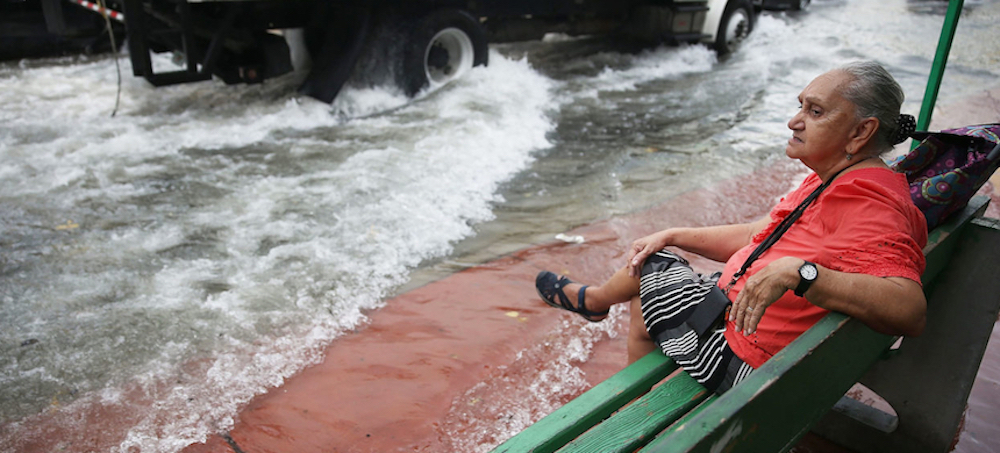 In Miami Beach, as elsewhere on the U.S. East Coast, flooding from seasonal high tides has been made worse in recent years by rising seas. (photo: Joe Raedle/Getty Images)
In Miami Beach, as elsewhere on the U.S. East Coast, flooding from seasonal high tides has been made worse in recent years by rising seas. (photo: Joe Raedle/Getty Images)
With the climate crisis intensifying, monitoring to provide early warnings for extreme weather has become more important than ever. There are currently about five times more disasters related to weather than occurred in the 1970s.
UN Secretary-General António Guterres is calling for an early warning system that covers everyone on the planet.
“Half of humanity is already in the danger zone,” said Guterres, as reported by Reuters. But, “one-third of the world’s people, mainly in least developed countries and small island developing states, are still not covered by early warning systems.”
World Meteorological Organization (WMO) Secretary-General Petteri Taalas said an investment of $1.5 billion is needed in the next five years for a worldwide early warning system to happen.
Guterres has called for a plan for the early warning system target to be presented at COP27, the next UN climate summit, in Egypt in November, The Guardian reported.
“It will not be easy, it will be challenging, but when one looks at the potential costs of mobilising the resources to make this a reality, it’s a mere fraction, a mere rounding error of the $14tn mobilised by G20 countries over the last two years to recover their economies from Covid-19,” said a senior UN official, as reported by The Guardian.
More than two million people have been killed by storms, floods, droughts and heat waves since 1970, according to WMO data, as Reuters reported. The data showed that these weather-related natural disasters resulted in $3.64 trillion in damages worldwide.
Currently, about a third of the world’s population is not covered by extreme weather early warning systems, with Africa being the most vulnerable with 60 percent of its population remaining unprotected, reported BBC News.
“Early warnings and action save lives,” said Guterres, as BBC News reported. “We must boost the power of prediction for everyone and build their capacity to act.”
The WMO will be looking into setting up technology with real-time atmospheric monitoring to warn people that extreme weather or a natural disaster is coming.
Mohammed Adow of Power Shift Africa said saving lives is essential, but the early warning systems are also about protecting people’s homes and livelihoods so that they aren’t left to start over in the aftermath, BBC News reported.
A storm warning 24 hours ahead of time can help people mitigate damage by about 30 percent, a 2019 Global Commission on Adaptation report said, as reported by Reuters.
“The global community needs to ensure the victims of climate catastrophes are helped to thrive, not just survive,” Adow said, as BBC News reported.
Special Coverage: Ukraine, A Historic Resistance
READ MORE
Follow us on facebook and twitter!
PO Box 2043 / Citrus Heights, CA 95611




No comments:
Post a Comment
Note: Only a member of this blog may post a comment.